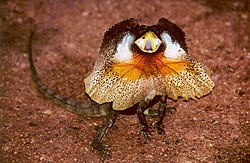Frill-necked lizard
The frilled lizard (Chlamydosaurus kingii) has a large reptile, thin frill around its head, which it displays in order to frighten enemies. To appear even more impressive, it also opens its mouth wide and often rears up on its hind legs. When frightened, this lizard will run away, using its back-legs only, earning it the nickname, the "bicycle lizard."
| Frill-necked lizard | |
|---|---|

| |
| Scientific classification | |
| Kingdom: | Animalia |
| Phylum: | Chordata |
| Class: | Reptilia |
| Order: | Squamata |
| Family: | Agamidae |
| Genus: | Chlamydosaurus Gray, 1827 |
| Species: | C. kingii
|
| Binomial name | |
| Chlamydosaurus kingii Gray, 1825
| |

| |
| Range map of frilled-necked lizard | |
Description
These lizards spend most of their life in trees (they are primarily arboreal). They live in the north of Australia and in New Guinea. They inhabit moist tropical and warm-temperate forests and in woodlands with shrubby understory. When displayed, the frill is 9.5-14 inches (24-34 cm) wide. When the lizard is at rest, the frill folds down on its shoulders. Adults are over 8 inches (20 cm) long.
Diet
Frill-necked Lizards are carnivorous (meat-eaters). They eat bugs (like cicadas, ants, spiders, termites) small mammals, and small lizards. They hunt in trees and on the ground.
Reproduction
Females lay 8 to 23 small eggs in an underground nest. These lizards hatch with the ability to be fully independent, hunt and to use their frill.
Frill-necked Lizard Media
Frilled lizard from Narrative of a Survey Volume 2, by Phillip Parker King, 1827






